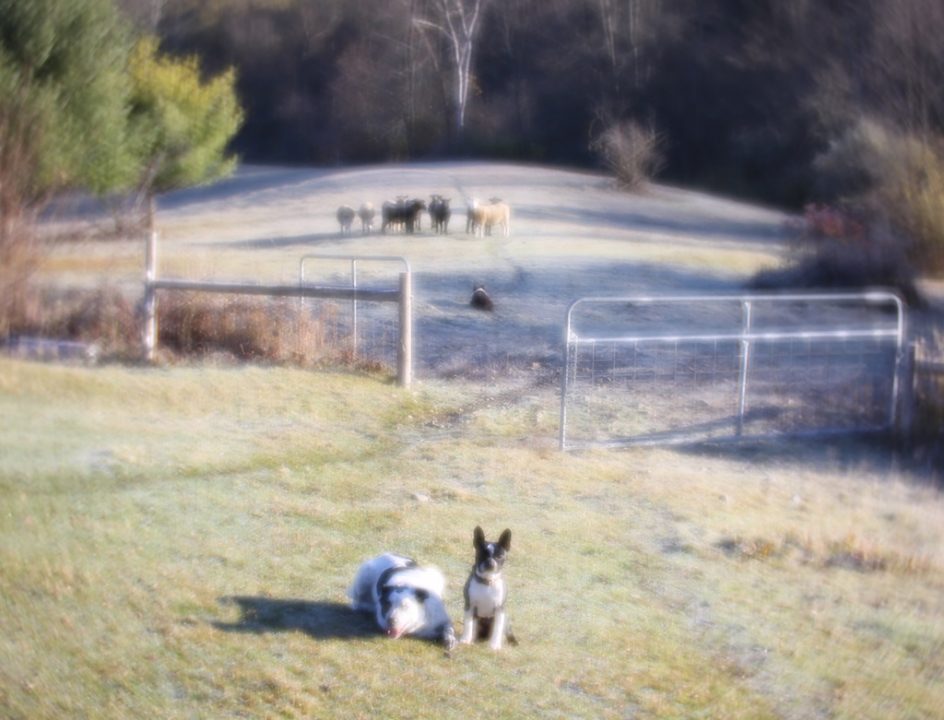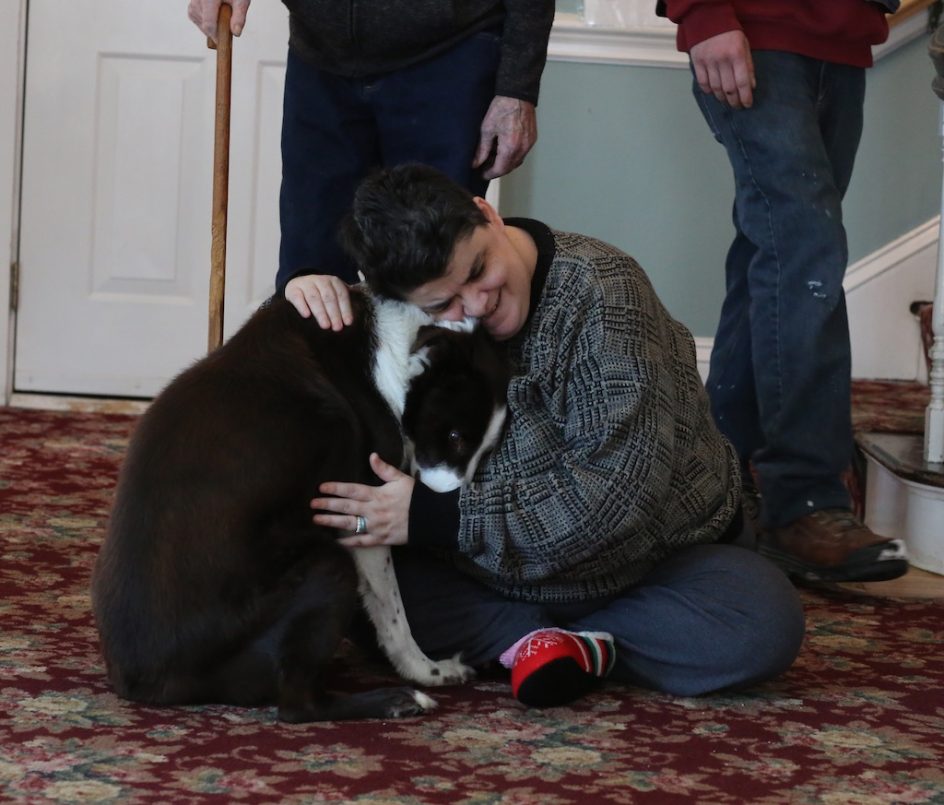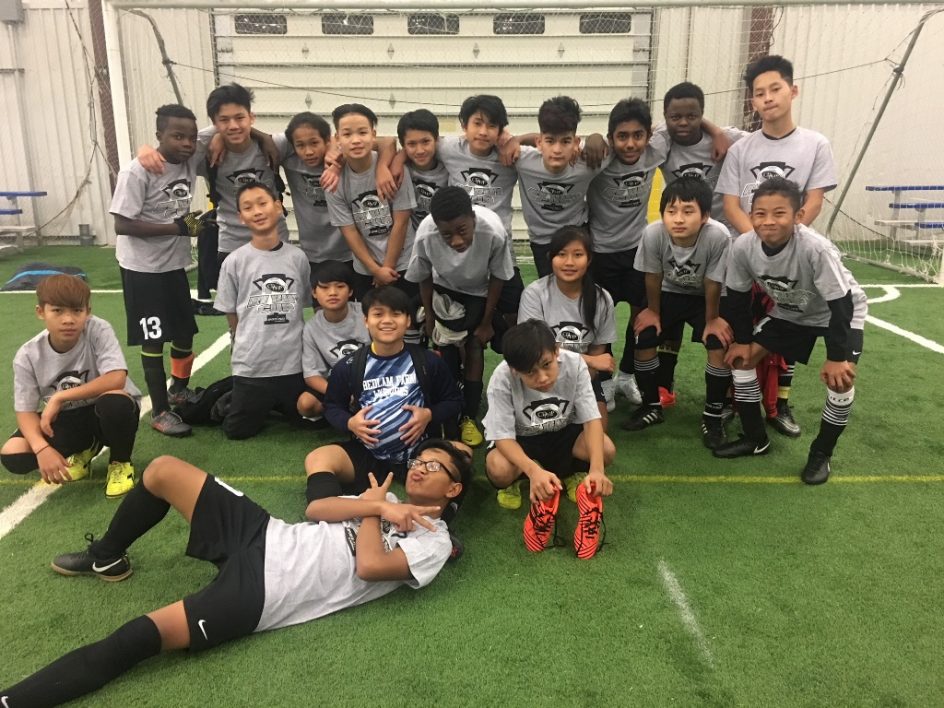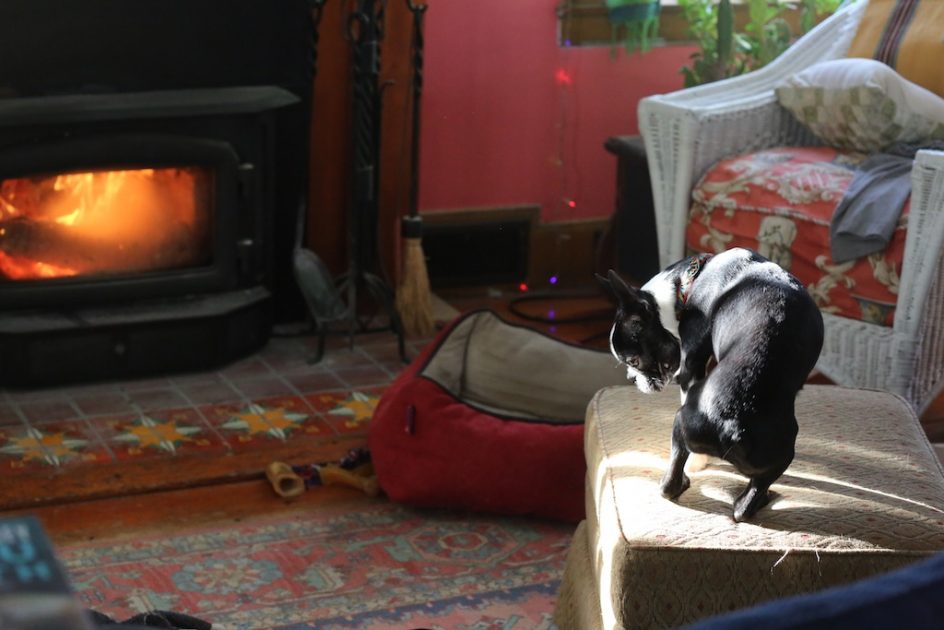
When you live with dogs, you make a deal, conscious or not. You will know loss, emotion, and grief. Dogs are different from people, they get sick often and never live as long as we would like. That is the deal. I am always puzzled by people who say they will never get another dog because they loved the last one so much.
Perhaps because I fell into a loveless life, love to me is something to cherished and grateful for, not something to never risk again. I always want another dog precisely because I loved the previous one so much.
I should say here that we are not anywhere near losing Gus, nor do I expect him to be gone from here. We are not at that stage in his illness nor do I expect it. We are stage one of a dread disease, and I am learning more about it every day and we are trying many things to see what works.
Because megaesophagus is such a dread and difficult-to-create disease, i have been thinking about how far we will go with Gus and trying to learn how much suffering he might incur as we stumble along. It is pretty clear to me that modern veterinary medicine has little to offer dogs like Gus, they can’t cure megaesophagus and have no cures.
Many people used custom made devices like Bailey Chairs or raised wooden bowls-on-benches to keep ME dogs alive for many years. We are all of us different, and I have developed a strong ethos about living with dogs that has or will someday come into play when it comes to Gus and his disease.
Gus is my first small dog, and he has squired his way into our hearts and lives. He fits in perfectly here, even the obsessive Fate loves chasing him around all day and playing tug-of-war with his toys.
In the dog world, as in the political world, there is little tolerance for people who are different. If you are different, if you sometimes think for yourself, you are an enemy to be feared and trusted. I try very hard to preserve my sense of my self as an individual, and I often find that a lonely place to be.
So I will have to weight and ponder my own ethics about dogs, illness, life spans and identity.
I work things out in my head by writing about them, and that is what I am doing here: working things out in my head and sharing them. That is what I do.
I don’t imagine having to reach any major conclusions about Gus for a long time, if ever. We are just in the beginning stages of this, and unless his own life is failing or in danger, we have lots of time, perhaps a natural life time for him.
But as I have written, it is good to think about these things before I am confronted with them, not after, when it is often too late to think rationally. Maria and I talk about these values and options a lot an we are of the same mind, although we often have different ways of approaching things.
First off, I have strong ethical concerns about spending many thousands of dollars on medical care for a chronically ill dog. I think it is wrong for me to do that in a world where so many children and people have nothing and are in such great need.
There are 67 million people living in overcrowded and filthy and dangerous refugee camps in our world, just to name one thing, and I balk at spending the $5,000 or $10,000 it would well take to examine and experiment and explore Gus’s illness for years. I know what medicine an X-rays and custom built chairs and special dog food and recipes and MRI’s and other new diagnostic tools cost. They cost a lot.
Several people have alarmed me by offering to launch gofundme sites to raise money for Gus’s care. I don’t want that and would never accept help for that.
These well-meaning people miss the point. It isn’t that I don’t have the money or can’t come up with it, it is that I think it would be wrong for me to take money for that or spend it that way. Gus is our responsibility and we can afford to take care of him. We are not seeking help and don’t need it.
I don’t know exactly what the financial boundary is for treating an illness like megaesophagus but I do know what people spend on their dogs when it comes to specialized medical care for them. Ten thousand dollars is at the low end of the scale.
Secondly I have always believed that dogs that cannot live the natural life of a dog – at any age – are not dogs I would wish to enable. I don’t judge other people or tell them what to do, but I do feel strongly that the life of a dog ought not to be artificially preserved to support the emotional lives and needs of humans.
I’ve interviewed nearly 200 vets over the course of my book writing about dogs, and every single one of them has told me that the worst thing they see in their practices are suffering dogs whose lives are prolonged well beyond their natural time because people just cannot bear to let them go.
I would consider it selfish to do that to Gus or any dog I love.
I have been monitoring the lives of ME dogs who spent many hours sitting upright in chairs or sitting up in the laps of people so they can live extra years. If people wish to do that, that is their business, I have nothing to say to them other than good luck. I am not sure that is a life I could feel good about pushing Gus into. He is an energetic free spirit, full of life and play, and a dog who can’t process food well is a dog whose life is shaped in great measure by his need for humans to care for him a substantial part of the time.
I believe dogs support us and our lives, and I wish to be free to do my work, write my books and blogs, take my photos, share life with Maria and perhaps it is ruthless, but there are only so many hours in a day I can or wish to spend supporting a suffering dog with a chronic illness. I am not one of those people who would turn my life over to the process, it would be a lie to say otherwise. And I love my dogs a lot.
A life with dogs for me is also a life in balance, we serve and love each other, but we each are entitled to search for our own destiny.
I’ve talked to enough ME dog owners by now to know that this disease changes the life of the dog and the people or family who own and love the dog.
Maria and I are working hard to come to terms with this new reality, and this struggle has just begun for us. We are not the least bit inclined to quit. i do want to have my head clear for this long up-and-down process so when and if the hard days come, I will be prepared and have a sense of what to do. I don’t wish to make any decisions in a cloud of fear or guilt or confusion. I am clear in my own had about boundaries and limits – emotionally, spiritually and financially.
So very soon or way down the road, I may well have to test my beliefs and see just how deep and strong they are. Megaesophagus is a tough disease, the real deal, there are no magic pills or miracle surgeries. It has left many dogs and humans in tatters. Many others live in peace with it. I will know soon enough which one we are here at the farm.
I am glad these decisions are far off, at least for now, although I know that is not in my hands.
Gus is a dog who is very much alive, despite his struggles with ME, he is enjoying life and full of spirit and affection. It is not time to make long and deep decisions about him, he brings us great joy and we have much to learn and other things to try.
Anyone who shares the story of their sick dogs online in America knows what they are in for.
In this case, I did ask for it, and I accept it. Standing my ground is very good for me, it is affirming and healing and promotes strength and resolution.
The furies of the animal world, the legions of second guessers, the hordes of amateur vets and diagnosticians, the people who love animals but seem to hate people, and the angry ideologues and animal thought police are always out in force and on the prowl. They do not care for people who make their own decisions.
But they will not frighten me or shut me up or keep me from sharing this journey. As many of you know, I will make the best decisions I can for Gus, working every step of the way with Maria – we are equal voices in this – and our vet, who we trust.
And with the other vets and researchers I have and will consult with.
I already know more about megaesophagus than many vets and most people, I will learn what else it is that I need to know and so will Maria.
Down the road – hopefully far down the road – I will come face to face with my own values, ethics and instincts. Megaesophagus is somewhat merciless, there are good endings and bad endings, but not always happy endings.
I intend to be prepared.



